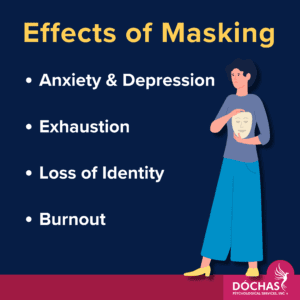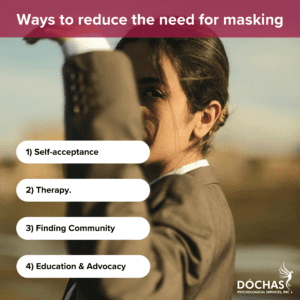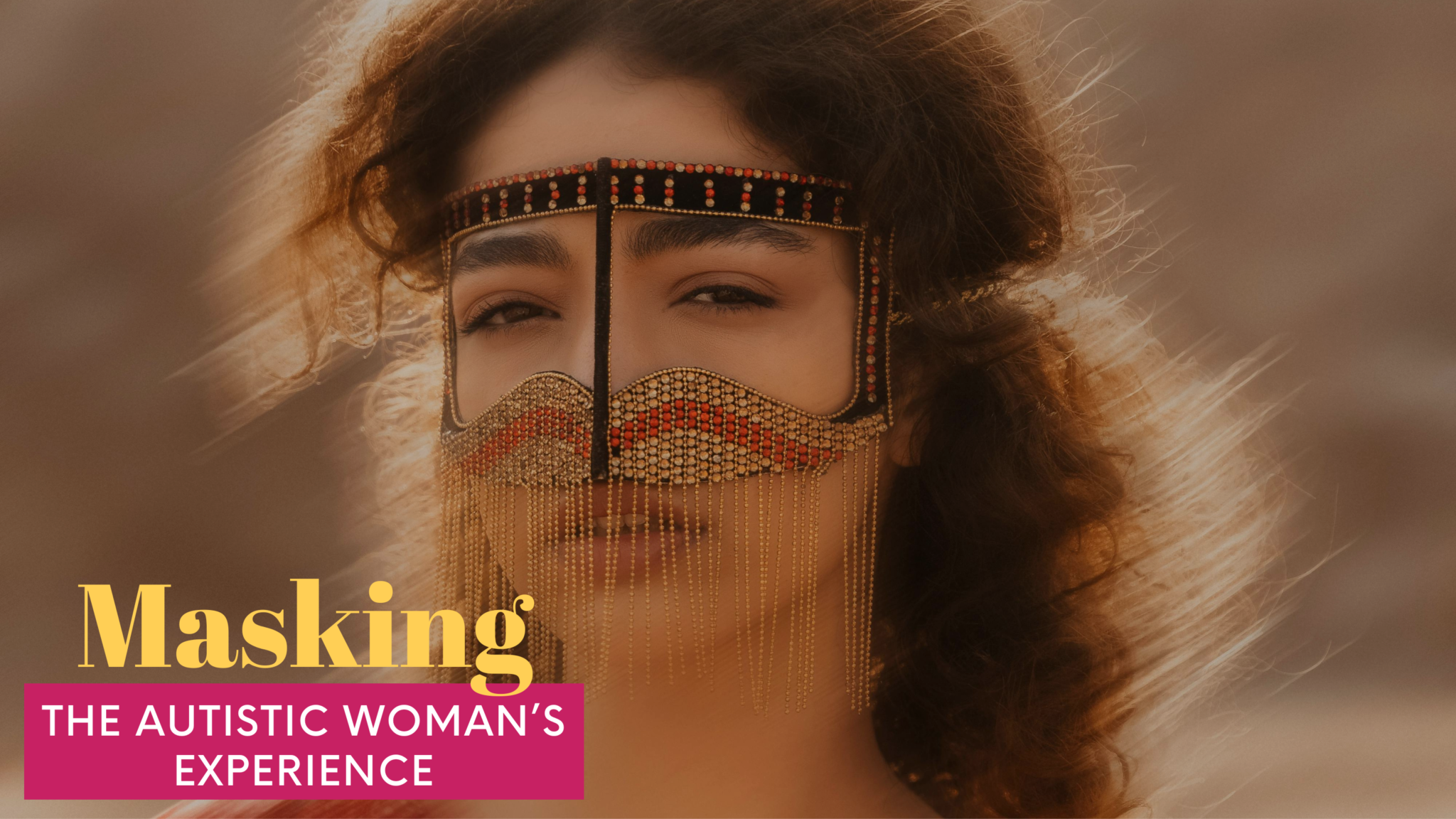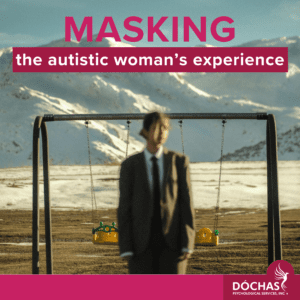Have you ever felt like you’ve acted in a way that didn’t feel quite like you?
Imagine being at a party where you don’t know anyone. You might find yourself smiling more than usual, laughing at jokes you don’t find funny, or trying to mirror the behaviour of those around you to fit in. This is a form of masking: changing your behaviour to meet social expectations.
For many people, masking is an occasional act, something done in specific situations. But for autistic women, masking can be a constant part of daily life. It’s a way to navigate social interactions and meet the expectations placed upon them by society. Sierra on the blog today – I wanted to explain masking, as understanding it can help us support those who feel the need to hide their true selves to fit in.
Why Do Autistic Women Mask?
Often starting at a young age, autistic women mask to avoid negative social reactions. Society expects women to be sociable, empathetic, and emotionally expressive. To meet these expectations, autistic women might mimic others, hide behaviours that seem different, and adopt socially accepted manners. For many women with autism, the pressure to fit in can be overwhelming, leading to emotional and mental health struggles.
Do Neurotypical People Ever Mask?
Yes, people without autism can also mask. Everyone might change their behaviour once in a while to fit social norms or expectations. This can happen during job interviews, first dates, or any situation where making a good impression feels important.
What Are the Effects of Masking?

Masking can have serious mental and emotional effects:
- Exhaustion: Constantly changing your behaviour to fit in is tiring.
- Anxiety and Depression: The pressure to conform and fear of being “found out” can lead to mental health issues.
- Loss of Identity: Over time, masking can make you feel disconnected from your true self.
- Burnout: The effort to keep up the mask can lead to burnout, where you can’t sustain the energy needed to keep hiding your true self.
How to Reduce Masking Behaviours

There are ways to help reduce the need for masking:
- Self-Acceptance: Embrace who you are. Being different is not a flaw; it’s what makes you unique.
- Therapy: Working with a therapist can help you explore your true identity and develop healthier ways to cope. Reach out at 780-446-0300 or info@dochaspsych.com, we would love to help!
- Finding Community: Being around supportive people who accept you can reduce the pressure to conform.
- Education and Advocacy: Raising awareness about autism and challenging societal norms can create a more inclusive environment where you feel less need to mask.
Understanding Your Own Masking Behaviours
The Camouflaging Autistic Traits Questionnaire (CAT-Q) is a 25-question self-report tool that helps identify masking behaviours in social interactions. It’s particularly useful for autistic women to understand their social behaviours better.
How Race, Ethnicity, Socioeconomic Status, and Sexual Orientation Influence Masking
The experience of masking in autistic women can vary significantly based on intersecting factors such as race, ethnicity, socioeconomic status, and sexual orientation. These intersections can affect:
- Access to Diagnosis: Differences in healthcare access and cultural attitudes toward mental health and neurodiversity can impact when and how autistic traits are recognized and diagnosed.
- Acceptance Within Communities: Cultural norms and community attitudes toward autism may influence acceptance and support for masking behaviours.
- Cultural Contexts: Different cultural expectations regarding social behaviour and gender roles can shape how autistic women perceive and express their identity, impacting their experience of masking.
Historical Context and Gender Bias in Autism Diagnosis
Early diagnostic criteria for autism were primarily based on male presentations of the condition. This historical bias contributed to:
- Delayed and Missed Diagnoses: Many autistic women were overlooked or misdiagnosed because their symptoms did not align with the predominantly male-defined diagnostic criteria.
- Misunderstanding of Female Autistic Traits: The belief that autism predominantly affects males led to a lack of understanding and recognition of how autism manifests in women.
Final Thoughts
Masking is a common experience for many autistic women, driven by societal pressures and the desire to fit in. While it can help in social situations, it often leads to emotional and mental health challenges. By understanding and addressing masking, we can create a more inclusive and supportive environment for autistic women, allowing them to embrace their true selves without fear or shame.
About Dóchas Psychological
Dóchas Psychological Services is a well-established and trusted therapy clinic located in Spruce Grove, Alberta. At Dóchas we value the idea that everyone deserves a safe space. Through connection and education, our team works hard to build a trustworthy relationship with each of our clients. It is our goal to create a community for our clients to feel like they belong.
Disclaimer
Information provided through Dóchas Psychological Services blogs or vlogs is meant for educational purposes only. They are NOT medical or mental health advice. You can read more about our disclaimer here.










